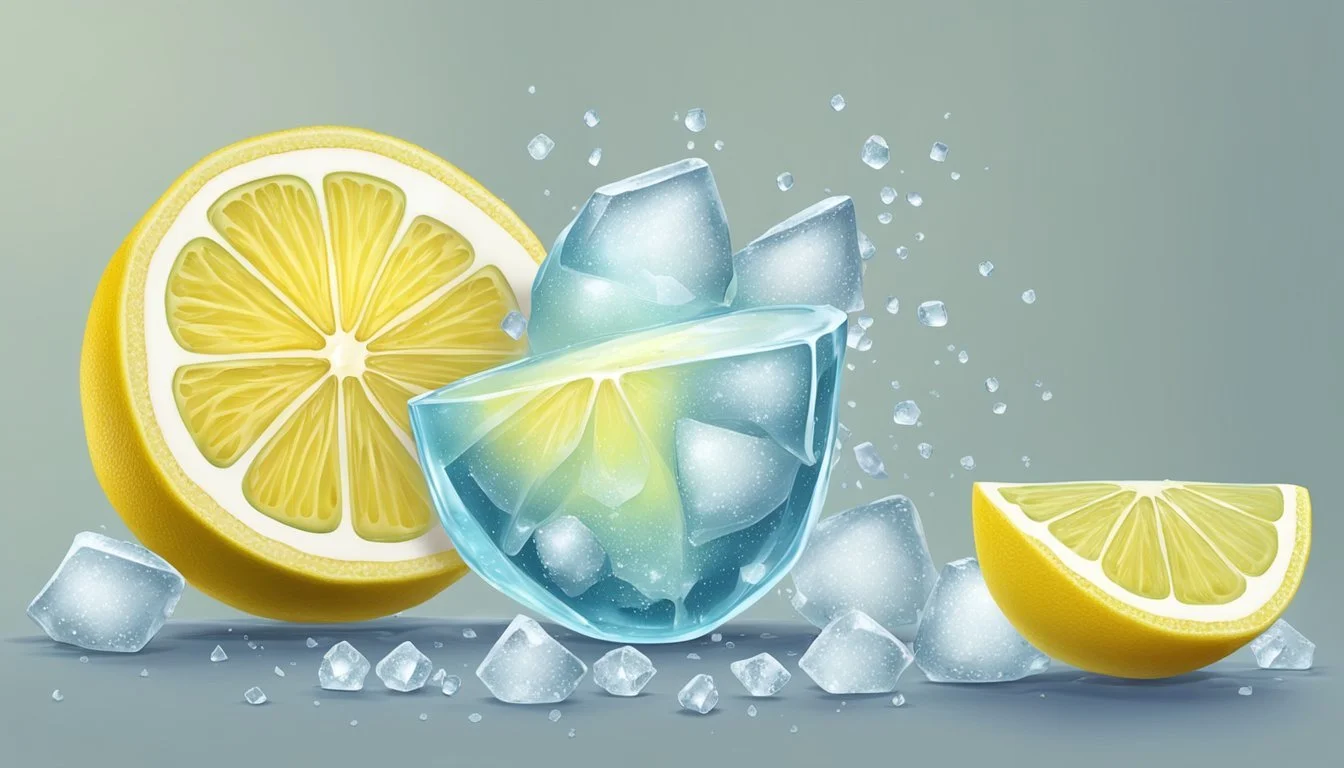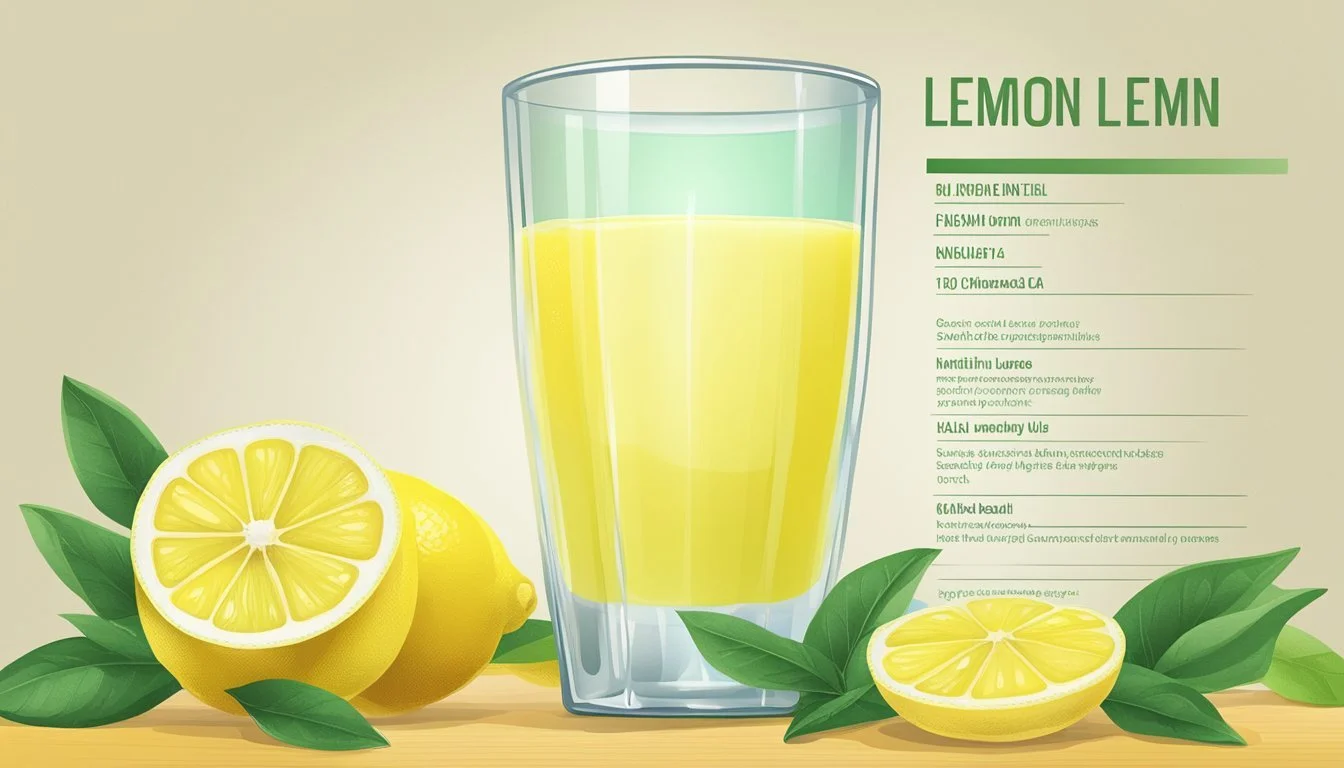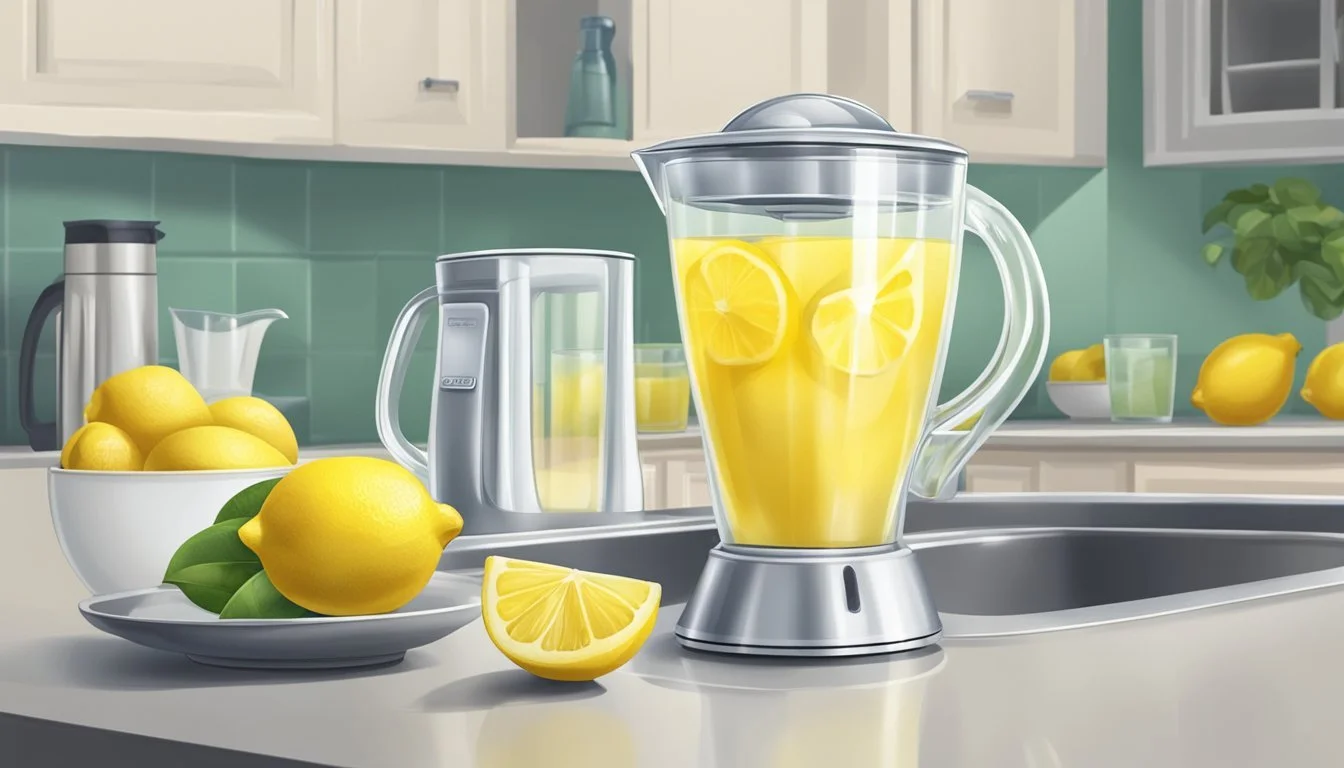Frozen vs Fresh Lemon Juice: Citrus Showdown
Lemon juice adds a bright, citrusy flavor to many dishes and drinks. When it comes to choosing between fresh and frozen lemon juice, consumers often wonder about the differences in taste, convenience, and nutritional value. Frozen lemon juice can be a convenient alternative to fresh, but it may lack the vibrant taste and aroma of freshly squeezed lemons.
The quality of frozen lemon juice depends on several factors, including the quality of the lemons used, the freezing process, and storage time. Flash-frozen juice tends to retain more of its original flavor. While frozen juice offers convenience and consistent quality, it may have a slightly muted or bitter taste compared to the bright, zesty flavor of fresh lemon juice.
Nutritionally, both fresh and frozen lemon juice provide vitamin C and other beneficial compounds. However, some of the delicate aromatic compounds in fresh lemon juice may be lost during the freezing process. For those prioritizing convenience, frozen or bottled lemon juice can be a practical option, while fresh lemons remain the top choice for optimal flavor in recipes and beverages.
Comparing Fresh and Frozen Lemon Juice
Fresh and frozen lemon juices offer distinct advantages in flavor, nutrition, storage, and convenience. Each type has unique characteristics that may suit different culinary needs and preferences.
Flavor Profile Differences
Fresh lemon juice provides a bright, zesty taste with complex aromatic notes. Its flavor is vibrant and bold, capturing the essence of freshly squeezed lemons. Frozen lemon juice, while still tart, may lack some of the nuanced flavors found in fresh juice.
The freezing process can slightly alter the taste, resulting in a more muted flavor profile. Some people find frozen juice to have a slightly cooked or processed taste. However, high-quality flash-frozen lemon juice can retain much of the fresh flavor.
Nutritional Value Comparison
Both fresh and frozen lemon juices offer similar nutritional benefits. They are excellent sources of vitamin C, antioxidants, and citric acid. Fresh lemon juice may have a slight edge in vitamin C content, as some degradation can occur during freezing and storage.
Nutrient Fresh Lemon Juice Frozen Lemon Juice Vitamin C Higher Slightly lower Antioxidants Present Present Citric Acid Present Present
The differences in nutritional value are generally minimal, and both types of juice can contribute to a healthy diet.
Shelf Life and Storage Solutions
Fresh lemon juice has a short shelf life, typically lasting 2-3 days when refrigerated. It's best used immediately after squeezing for optimal flavor and nutritional benefits.
Frozen lemon juice offers extended storage options. When properly frozen, it can last up to 3-4 months without significant quality loss. This makes it a practical choice for long-term storage and reduces food waste.
Tips for storing lemon juice:
Fresh: Store in an airtight container in the refrigerator
Frozen: Use ice cube trays for easy portioning
Convenience in Usage and Accessibility
Frozen lemon juice provides convenience and consistent availability. It eliminates the need for squeezing lemons each time juice is required, saving time and effort in recipe preparation.
Fresh lemons offer versatility beyond just juice. They provide zest and can be used for garnishing. However, they require more preparation time and may not always be readily available.
Frozen juice is particularly useful for recipes that require precise measurements, as its acidity levels are more consistent than fresh lemons, which can vary in juiciness and tartness.
Health Benefits and Nutritional Content
Lemon juice provides numerous health benefits and essential nutrients. Its rich nutritional profile supports various bodily functions and promotes overall wellness.
Vitamin C and Antioxidant Levels
Lemon juice is an excellent source of vitamin C, a powerful antioxidant. Fresh lemon juice contains approximately 30-40 mg of vitamin C per 100 ml. This vital nutrient supports immune function and collagen production.
Frozen lemon juice typically retains most of its vitamin C content. The freezing process helps preserve this nutrient, making it a viable alternative to fresh juice.
Antioxidants in lemon juice, including flavonoids and limonoids, help combat free radicals. These compounds may reduce oxidative stress and inflammation in the body.
Mineral Content Including Iron and Calcium
Lemon juice contains small amounts of essential minerals. It provides trace amounts of iron, which is crucial for oxygen transport in the body.
Calcium is present in lemon juice, though in limited quantities. This mineral supports bone health and muscle function.
Other minerals found in lemon juice include:
Potassium
Magnesium
Phosphorus
These minerals contribute to various physiological processes, including nerve function and fluid balance.
Impact on Digestion and Immune System
Lemon juice can aid digestion by stimulating the production of digestive juices. Its acidic nature may help break down food more efficiently.
The high vitamin C content in lemon juice supports immune function. It enhances the production and activity of white blood cells, crucial for fighting infections.
Citrus fruits, including lemons, contain pectin fiber. This soluble fiber can promote digestive health and may help regulate blood sugar levels.
Lemon juice's antibacterial properties may help combat harmful bacteria in the digestive tract.
Role in Hydration and Detoxification
Adding lemon juice to water can enhance hydration. Its refreshing taste may encourage increased fluid intake throughout the day.
Lemon juice supports the body's natural detoxification processes. It may stimulate liver function and promote the elimination of toxins.
The citric acid in lemon juice can help prevent kidney stone formation by increasing urine volume and pH levels.
Lemon juice's diuretic properties can aid in flushing out toxins through increased urine production.
Culinary Applications and Recipes
Lemon juice adds brightness and acidity to a wide range of culinary creations. Its versatility shines in beverages, savory dishes, baked goods, and creative kitchen uses.
Use in Beverages and Lemonade
Fresh lemon juice is the gold standard for lemonade. It provides a vibrant, zesty flavor that bottled juice can't match. Mix 1 cup fresh-squeezed lemon juice with 1 cup sugar and 4 cups water for classic lemonade.
For cocktails, fresh juice is preferred for its superior taste and aroma. It enhances drinks like margaritas, whiskey sours, and gin fizzes.
Frozen lemon juice can be a convenient alternative for smoothies and iced teas. Simply thaw the desired amount and blend or stir into your drink.
Cooking with Lemon Juice
Lemon juice is a culinary powerhouse in savory dishes. It brightens flavors and balances rich or fatty foods. Fresh juice works best in uncooked applications like salad dressings and marinades.
For cooked dishes, bottled lemon juice can be a suitable substitute. Its consistent acidity is ideal for recipes requiring precise pH levels, such as preserves and pickles.
Try these applications:
Drizzle over grilled fish or roasted vegetables
Add to pasta sauces for a hint of brightness
Use in homemade mayonnaise or aioli
Incorporate into meat marinades to tenderize
Baking Considerations
In baking, lemon juice serves multiple purposes. It adds flavor, acts as a natural preservative, and reacts with baking soda to create lift in cakes and quick breads.
Fresh lemon juice is preferred for its superior flavor in lemon bars, meringues, and citrus-forward desserts. However, bottled juice can work well in recipes where lemon is a background note.
Frozen lemon juice can be used in baking after thawing. It's particularly useful for making large batches of lemon curd or when fresh lemons are out of season.
Tips for baking with lemon juice:
Zest lemons before juicing for maximum flavor
Adjust sugar levels to balance acidity
Use room temperature juice to prevent curdling in batters
Alternative Uses in the Kitchen
Lemon juice's acidity and natural cleaning properties make it useful beyond traditional cooking. It can help prevent browning in cut fruits and vegetables. Toss sliced apples or avocados with a splash of lemon juice to keep them fresh.
As a meat tenderizer, lemon juice breaks down tough fibers. Brush it on tough cuts before cooking for added tenderness and flavor.
In preserving, lemon juice's high acidity inhibits bacterial growth. Use it to increase acidity in home canning projects or to extend the shelf life of homemade condiments.
Creative kitchen uses:
Clean cutting boards and wooden utensils
Remove odors from hands after handling garlic or fish
Descale kettles and coffee makers
Brighten copper cookware
Understanding Lemon Juice Processing
Lemon juice processing involves various methods that impact flavor, shelf life, and convenience. Each technique offers unique characteristics and benefits for consumers and manufacturers.
Freshly Squeezed Lemon Juice
Freshly squeezed lemon juice is obtained by manually or mechanically extracting juice from ripe lemons. This method preserves the vibrant flavor and aroma of the fruit. The process typically involves washing, cutting, and pressing the lemons to release their juice.
Fresh lemon juice retains maximum nutritional value, including vitamin C and antioxidants. It has a bright, zesty taste that enhances culinary dishes and beverages. However, fresh juice has a short shelf life and requires immediate use or refrigeration.
Chefs and home cooks often prefer freshly squeezed lemon juice for its superior taste and natural properties. It's particularly valued in recipes where lemon flavor is a key component.
Commercial Freezing Techniques
Commercial freezing of lemon juice involves rapid cooling to preserve flavor and nutritional content. The process begins with extracting juice from fresh lemons, then quickly freezing it to maintain quality.
Flash-freezing is a common technique used in industrial settings. This method rapidly lowers the temperature of the juice, forming small ice crystals that minimize damage to cellular structures. The result is frozen lemon juice that closely resembles fresh when thawed.
Frozen lemon juice offers a balance between convenience and quality. It has a longer shelf life than fresh juice while retaining much of its original flavor profile. Some studies suggest that frozen lemons may yield more juice than fresh ones when thawed and squeezed.
Bottled Lemon Juice Variants
Bottled lemon juice undergoes processing to extend shelf life and ensure consistency. Manufacturers use various methods to produce shelf-stable products that maintain a lemon-like flavor.
Some bottled juices are made from concentrate, where water is removed from fresh lemon juice and later reconstituted. Others are processed using heat pasteurization to eliminate bacteria and extend shelf life.
Preservatives like sodium benzoate or potassium metabisulfite are often added to bottled lemon juice. These additives help maintain color and prevent spoilage, allowing the product to be stored at room temperature for extended periods.
Bottled lemon juice offers convenience and consistent acidity levels, making it popular for cooking and baking. However, it may lack the fresh taste and aromatic qualities of freshly squeezed or frozen alternatives.
Practical Tips for Consumers
Maximizing the use of lemon juice requires proper freezing, thawing, and selection techniques. These methods ensure optimal flavor and quality for various culinary applications.
How to Freeze Lemon Juice at Home
Freezing lemon juice preserves its freshness and extends its usability. Start by juicing fresh lemons and straining out seeds and pulp. Pour the juice into ice cube trays, filling each compartment about 3/4 full to allow for expansion. Freeze until solid, typically 2-3 hours.
Once frozen, transfer the cubes to freezer bags. Remove excess air before sealing to prevent freezer burn. Label the bags with the date and quantity for easy reference.
For larger portions, use silicone molds or small plastic containers. Leave some space at the top for expansion. These methods allow for convenient portioning when cooking or baking.
Thawing Frozen Lemon Juice
Thawing frozen lemon juice correctly maintains its flavor and nutritional value. The safest method is to transfer the desired amount to the refrigerator and let it thaw overnight.
For quicker results, place the frozen juice in a sealed plastic bag and submerge it in cool water. Change the water every 30 minutes until thawed. This method typically takes about an hour for a cup of juice.
Avoid using hot water or a microwave, as these can alter the flavor and potentially compromise food safety. Once thawed, use the lemon juice within 2-3 days for best quality.
Identifying Quality Lemon Juice Products
When selecting bottled or frozen lemon juice, check the ingredient list. High-quality products contain only lemon juice without added preservatives or sweeteners.
Look for brands that use cold-pressed or flash-frozen techniques, as these methods better preserve the juice's natural flavor and nutrients. Organic options may offer additional benefits for those concerned about pesticide exposure.
Compare acidity levels between brands. A pH range of 2.0-2.6 is ideal for most culinary applications. Products with consistent acidity levels are particularly useful for baking and preserving.
Consider packaging when choosing frozen lemon juice. Opaque, airtight containers protect against light and air exposure, which can degrade quality over time.
Factors Affecting Lemon Juice Choice
Several key factors influence the decision between frozen and fresh lemon juice. These include financial considerations, flavor preferences, ingredient composition, and nutritional content.
Cost and Price Considerations
Frozen lemon juice often comes at a lower price point than fresh lemons. A bottle of concentrated juice can yield multiple servings, making it more economical for frequent use. Fresh lemons, while potentially pricier, offer versatility beyond just juice extraction. Their zest and pulp can be utilized in various recipes. Seasonal price fluctuations affect fresh lemons, while frozen juice prices remain relatively stable year-round.
Bulk purchases of frozen juice can further reduce costs for high-volume users like restaurants or bakeries. Home cooks may find fresh lemons more cost-effective if they only need small amounts occasionally.
Taste Preferences and Sweeteners
Fresh lemon juice boasts a bright, vibrant flavor profile. Its taste is often described as more authentic and zesty. Frozen juice, while convenient, may have a slightly muted or bitter flavor due to processing and storage.
Some frozen juices contain added sweeteners to balance tartness. This can be beneficial for those who prefer a milder taste or use lemon juice in sweet recipes. Fresh lemons allow for more control over sweetness levels.
Concentrated lemon juice offers consistency in flavor, which can be advantageous in standardized recipes. Fresh lemons may vary in taste intensity based on ripeness and variety.
Presence of Additives and Preservatives
Frozen lemon juice typically contains preservatives to extend shelf life. Common additives include sulfites, which help maintain color and prevent spoilage. Some brands may also include flavor enhancers or stabilizers.
Fresh lemons are free from additives, appealing to those seeking a more natural product. However, they have a shorter shelf life and require proper storage to prevent molding.
Organic frozen juices are available for consumers concerned about pesticide residues. These products often have fewer additives but may come at a premium price.
Nutrient Loss and Concentration Levels
Fresh lemon juice contains higher levels of vitamin C and other nutrients compared to frozen varieties. The freezing process and long-term storage can lead to some nutrient degradation.
Concentrated lemon juice may have a higher acid content per volume. This can be beneficial for recipes requiring strong lemon flavor or for making lemon water.
Some frozen juices are fortified with additional vitamins to compensate for losses during processing. Fresh lemons provide fiber from pulp, which is absent in most bottled juices.
Heat-sensitive compounds like certain antioxidants may be reduced in frozen juice due to pasteurization. Fresh lemons retain these compounds, potentially offering more health benefits.
Conclusion
Fresh and frozen lemon juice each have distinct advantages. Fresh juice offers a vibrant flavor and aroma that many prefer. It also retains the highest levels of vitamin C and other nutrients.
Frozen lemon juice provides convenience and consistent acidity. This makes it ideal for recipes requiring precise measurements, like preserves and baked goods. Freezing can actually increase juice yield from lemons.
Both options offer similar nutritional benefits overall. The choice often comes down to personal preference and intended use. For drinks and dressings, fresh may be best. For cooking and baking, frozen can work equally well.
Quality matters for both types. Using ripe lemons or flash-frozen juice helps maximize flavor and nutrition. Proper storage is also key to maintaining quality over time.
Ultimately, having both on hand allows flexibility. Fresh lemons provide zest and garnishes, while frozen juice offers a backup option. This combination covers most culinary needs involving lemon juice.





